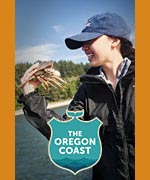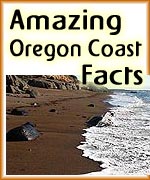 |
Oregon Officials Warn Do Not Pick Up Wildlife in Forests, on Coast
Published 05/25/2012
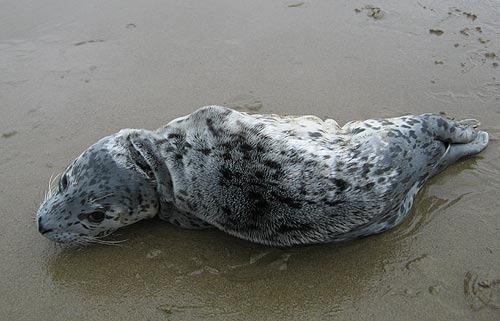
(Oregon Coast) – It's spring, and that means seals are molting, baby seals are resting on the shore and wildlife in coastal forests and especially inland are giving birth to their young. (Photo above: baby seal resting on the beach, courtesy Seaside Aquarium)
Oregon wildlife officials want to remind everyone – especially on this big vacation weekend – to stay away from baby seals or sea lions on the Oregon coast, but also to keep away from young animals in the wild of inland forests throughout the state.
Oregon Department of Fish and Wildlife (ODFW) said this is a time that bears, deer and other animals have newborns in tow, which sometimes means leaving them alone for a while so that they can feed or even not draw attention to their little ones.
“Unfortunately, every year well-meaning people pick up young wildlife and take it home in an attempt to care for it, and if calls to local ODFW offices are any indication, spring 2012 will not be an exception,” ODFW said in a press release.
To those in major forest areas in the Willamette Valley, or near towns like Bend, Ashland, Pendleton, Crater Lake or Silverton, all this presents some real dangers – for you but likely more for the young animal.
Tonya Moore, ODFW North Willamette Watershed District assistant wildlife biologist, has received two calls in two days about fawns. This included one Portland-area family that had taken a fawn to their home. Officials had to come and take back to where it was found.
Well-meaning people are under the mistaken impression these creatures - such as fawns, birds or raccoons – need help. They make the major mistake of bringing the critter home.
“We know people are concerned about young wildlife, but the best thing to do is to leave them where you found them,” said Moore.
Jim Cadwell, ODFW wildlife biologist in LaGrande, said picking up wildlife dramatically decreases their chance of survival.
“Mothers who leave their young know exactly where they are and will return,” Cadwell said. “And when fledgling birds are learning to fly, they will spend time on the ground.”
Cadwell said that deer fawns and elk calves are very difficult to rehabilitate for release into the wild and their survival rate following release is usually low.
The same holds true for baby seals along the Oregon coast. It's entirely possible you'll find them resting on beaches. But they too need to be left along, as their mothers are nearby and aware of where they left their young ones. You increase the chance of chasing mom off if you linger.
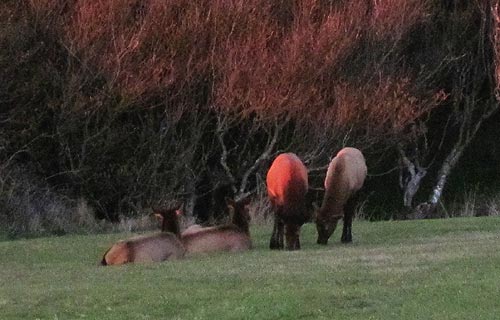
Above: Elk around Cannon Beach.
Aside from all this science and common sense, it's actually illegal to pick up or disturb wildlife in forests or on the beaches.
In Central Point, Oregon, Rosemary Stussy, ODFW wildlife biologist, gets calls every spring and summer about young bears “alone” in the woods and fledgling birds on the ground.
This became a major problem in southern Oregon last week when a family picked up a baby bear. While absolutely cute and adorable, it was then destined to live out its life in a zoo. The Oregon Zoo in Portland is currently taking care of the cub and it will eventually be moved to a facility in another state.
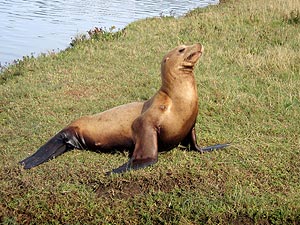 Officials warn that especially with black bears found alone in the woods: stay way. You could get killed by an angry mother bear who is usually not far away.
Officials warn that especially with black bears found alone in the woods: stay way. You could get killed by an angry mother bear who is usually not far away.
“The only exception is if the mother has been hit by a car or has been killed, and even then you should call ODFW or OSP and tell them where the animal is,” ODFW said.
ODFW issued this list of Things You Should Do (and this applies to animals in the woods as well as mammals found on beaches):
Never assume an animal is orphaned and remove it from the woods, forest or even your backyard. Leave it alone and leave the area. Call your local ODFW office or OSP before you approach any young wildlife.
Keep your dog or cat away from young wildlife.
If you see an animal that is clearly is in distress, is being disturbed by people or pets, or is lying near or on a road, call your local ODFW office, Oregon State Police office, or a local wildlife rehabilitation center that is approved by ODFW.
If you see a seal pup, young sea lion, or other marine mammal in distress, contact OSP’s hotline at 1-800-452-7888.
Don’t pick up young wildlife, it’s illegal. Removing wildlife from the wild and keeping it in captivity without a permit is a Class A misdemeanor. Holding marine mammals or migratory birds, or disturbing the nests, eggs, and young of migratory birds, are violations of federal laws.
Keywords: wildlife, seals, bears, Cannon Beach, , cape kiwanda, Pacific City, Ashland, LaGrande, Silverton, Portland, Yachats, Depoe Bay, Newport, Lincoln City, Oceanside, Astoria, Oregon coast, science.
More About Oregon Coast hotels, lodging.....
More About Oregon Coast Restaurants, Dining.....
 |
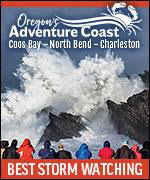 |
 |
LATEST OREGON COAST NEWS STORIES
Oregon Coast, Valley and Likely Washington Coast to Get Some Aurora Borealis ... |
Back to Oregon Coast
Contact Advertise on BeachConnection.net
All Content, unless otherwise attributed, copyright BeachConnection.net Unauthorized use or publication is not permitted
Secrets of the Season |
Unusual Travel Articles TravelParanormal.com allows you to submit your own creepy tale or debunk one - or see up-to-the-minute news headlines about travel and the paranormal. News Headlines from All Over Oregon Need to scan Oregon headlines? Constantly updated news from all over Oregon: a comprehensive, up-to-the-minute display of news headlines from a variety of media |












